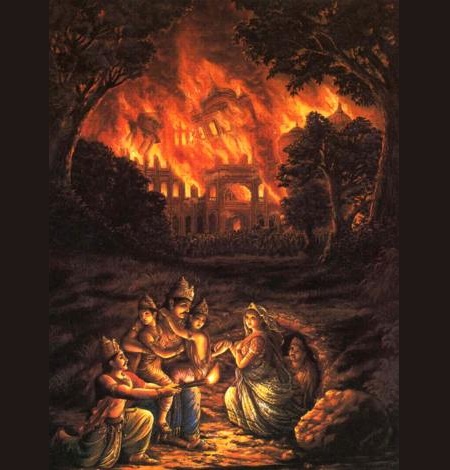Question: Even after doing lots of pious activities, devotional services, one still undergoes a lot of suffering? Why? What is the solution? Good people go through bad things and bad people go through good things? Why?
Answer by Romapada Swami: The root cause of suffering is ignorance, which results in sin. When someone has a contagious disease, we can invariably conclude that they must have contracted the infection somehow, even if it may not be apparent wherefrom, how and so forth. Similarly, when there is some suffering we can conclude that there must have been some past sinful act committed by the person in question, either in this or a previous lifetime, knowingly or unknowingly.
Everyone in this material world, even those who are pious and reasonably good-hearted, still performs many sinful activities. Even seemingly harmless acts such as our cooking and eating food or even in walking or breathing, we cause suffering to other living entities, what to speak of other acts of deliberate harshness in speech & action, and our exploitation of Krishna’s energies for selfish ends! Each of these acts bears consequent reactions.
Pious activities have their own good karmic reactions (viz. “punya”) but punya, even volumes of it, does not negate or counteract the sinful reactions. One has to both enjoy the results of punya as well as suffer whatever sinful reactions are due them. A good example is the story of King Nrga found in the Krishna Book (Ch 64) When we see a so-called “bad” person flourishing, it is to be understood that they are simply reaping the results of some past piety.
If any activity involves some good or bad karma, are we to resign that suffering is inevitable? No, Bhagavad-Gita gives a solution to this predicament: all work should be done as a sacrifice to Vishnu for such work has no pious/sinful reactions and causes no bondage. (Please study Bhagavad Gita 3.9-14, 4.31) There are also specific ways by which our past sinful reactions can be countered and the best of these methods is performing pure devotional service by taking shelter and careful guidance of pure devotees. You can find a more detailed discussion of this topic in the Inquiries into the Absolute – Digest 2 Q 12, Digest 4 Q2, Digests 117 and 120.
You have raised the question that even after performing much devotional service, one may experience some suffering. But this suffering is not the same as that of an ordinary fruitive worker. What seems like suffering in the case of fully surrendered devotees like the Pandavas or Srila Prabhupada is in fact not at all suffering, but a type of transcendental exchange with the Lord. But even in the beginning stages, pure devotional service brings relief from all distress, as explained in Nectar of Devotion Ch1. You can find further discussion on this point in Digest 53.
You may also find it insightful to go over the previous Digests where I have addressed various topics and many such commonly raised questions.







